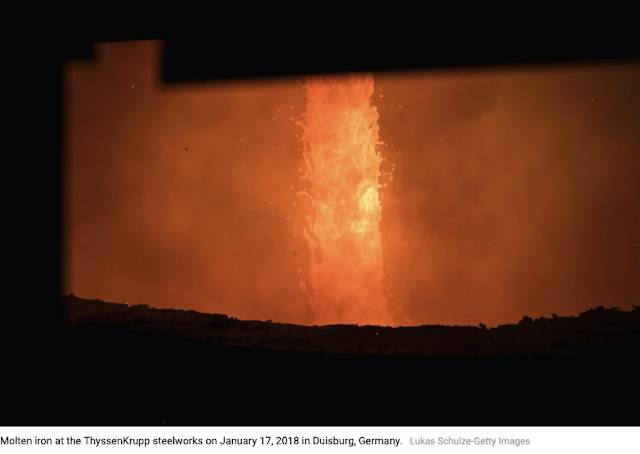"Modern societies would be impossible without mass-scale production of many man-made materials....
"Four materials rank highest on the scale of necessity, forming what I have called the four pillars of modern civilisation: cement, steel, plastics, and ammonia are needed in larger quantities than are other essential inputs. The world now produces annually about 4.5 billion tons of cement, 1.8 billion tons of steel, nearly 400 million tons of plastics, and 180 million tons of ammonia. But it is ammonia that deserves the top position as our most important material: its synthesis is the basis of all nitrogen fertilisers, and without their applications it would be impossible to feed, at current levels, nearly half of today’s nearly 8 billion people.
"The dependence is even higher in the world’s most populous country: feeding three out of five Chinese depends on the synthesis of this compound. This dependence easily justifies calling ammonia synthesis the most momentous technical advance in history: other inventions provide our comforts, convenience or wealth or prolong our lives—but without the synthesis of ammonia, we could not ensure the very survival of billions of people alive today and yet to be born....
"[T]hese four materials, so unlike in their properties and qualities, share three common traits: they are not readily replaceable by other materials (certainly not in the near future or on a global scale); we will need much more of them in the future; and their mass-scale production depends heavily on the combustion of fossil fuels...
"Fossil fuels remain indispensable for producing all of these materials.
"Ammonia synthesis uses natural gas both as the source of hydrogen and as the source of energy needed to provide high temperature and pressure. Some 85% of all plastics are based on simple molecules derived from natural gas and crude oil, and hydrocarbons also supply energy for syntheses. Production of primary steel starts with smelting iron ore in blast furnace in the presence of coke made from coal and with the addition of natural gas, and the resulting cast iron is made into steel in large basic oxygen furnaces. And cement is produced by heating ground limestone and clay, shale in large kilns, long inclined metal cylinders, heated with such low-quality fossil fuels as coal dust, petroleum coke and heavy fuel oil.
"As a result, global production of these four indispensable materials claims about 17 percent of the world’s annual total energy supply, and it generates about 25 percent of all CO2 emissions originating in the combustion of fossil fuels. The pervasiveness of this dependence and its magnitude make the decarbonisation of the four material pillars of modern civilisation uncommonly challenging....
"Modern economies will always be tied to massive material flows, whether those of ammonia-based fertilisers to feed the still-growing global population; plastics, steel, and cement needed for new tools, machines, structures, and infrastructures; or new inputs required to produce solar cells, wind turbines, electric cars, and storage batteries. And until all energies used to extract and process these materials come from renewable conversions, modern civilisation will remain fundamentally dependent on the fossil fuels used in the production of these indispensable materials. No artificial intelligence designs, no apps, no claims of coming 'dematerialisation' will change that."~ Vaclav Smil, from his Time article 'The Modern World Can't Exist Without These Four Ingredients. They All Require Fossil Fuels' -- adapted from his new book How the World Really Works. Hat tip Jo Nova, who comments "Not the kind of article we’d [normally] expect to see in Time magazine. A 100% endorsement of the inescapable need for fossil fuels."
Monday, 16 May 2022
"The Modern World Can't Exist Without These Four Ingredients. They All Require Fossil Fuels"
Labels:
AI,
China,
Civilisation,
Energy,
Ethics,
EVs,
Fossil Fuels,
Global Warming
Subscribe to:
Post Comments (Atom)

No comments:
Post a Comment